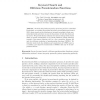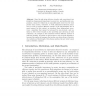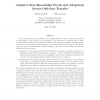141 search results - page 2 / 29 » Oblivious Transfer and Linear Functions |
TCC
2005
Springer
13 years 11 months ago
2005
Springer
We study the problem of privacy-preserving access to a database. Particularly, we consider the problem of privacy-preserving keyword search (KS), where records in the database are ...
TRUST
2010
Springer
13 years 10 months ago
2010
Springer
us Transfer based on Physical Unclonable Functions (Extended Abstract)" Session 2 (Tuesday 15:00 - 16:30) Place: „Salon Tiergarten“ 15:00-15:30 Patrick Koeberl (Intel; Ire...
CRYPTO
2005
Springer
13 years 11 months ago
2005
Springer
Since bit and string oblivious transfer and commitment, two primitives of paramount importance in secure two- and multi-party computation, cannot be realized in an unconditionally ...
CRYPTO
1990
Springer
13 years 9 months ago
1990
Springer
This paper describes a method for n players, a majority of which may be faulty, to compute correctly, privately, and fairly any computable function f(Xl, ...,x,) where xi is the i...
TCC
2009
Springer
14 years 6 months ago
2009
Springer
In the setting of secure computation, a set of parties wish to securely compute some function of their inputs, in the presence of an adversary. The adversary in question may be st...




